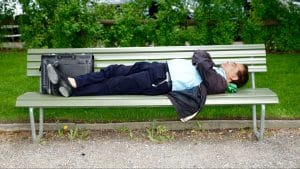The 10 Most Common Sleep Myths That Don’t Affect Your Rest
written by / December 31, 2019

Our society is flooded with misconceptions about healthy sleep practices. Everyone seems to be an expert, and everyone (whether they be a professional or layperson) seems to have their own be-all and end-all advice on the matter. As a direct result of this, sleep myths seem to be on the rise.
Our society is moving at a faster pace than ever before. Advancements in technology have made us less patient—and our pursuit of better careers and more material possessions are trumping our biological needs of healthy diets, sunlight, exercise, and, of course, ample levels of sleep.
Ironically, the biggest myth about sleep is that sleep itself isn’t as important as we once thought. In many magazine articles and interviews, celebrities boast of sleeping only five or six hours a day. Meanwhile, others report sleeping nine to ten hours per night. This disparity within pop-culture has led to celebrities and social media influencers (who seem to pull more weight than scientists or medical professionals) to conclude that healthy sleep patterns aren’t as vital as we think.
Plus, the stigma surrounding sleep myths and psychology are forever increasing. Even science itself seems divided about how many hours we actually need to achieve healthy sleep cycles, whether those hours should be segmented or not, and how to prioritize sleep in an ever-increasing environment of artificial stimulation. Sleep is actually one of the most valuable tools we have. Good sleep practices promote a healthy body and mind, leaving us feeling more energized and productive than we could ever imagine.
In this article, we’ll be looking at sleep facts while highlighting and examining some of the most common myths that seem to permeate the very fabric of modern society. These myths can impede our wellbeing, impacting us on a root level. By debunking them, we aim to give you the opportunity to correct your own sleep habits and enjoy the maximum benefits your sleep cycles can offer you.
Sleep Myths and Facts
Myth 1: Blue light is the enemy.
The idea that blue light is unhealthy seems to be making the rounds these days—it’s something discussed almost daily across the internet.
With electronic devices such as computers, laptops, tablets, and smartphones becoming more prevalent in society, there’s been a great deal of debate about the blue light sleep myth. Many companies have pounced on this opportunity and created “special” filters and glasses manufactured to counteract the so-called dangers of blue light. But is blue light really harmful? A sleep study conducted by UCLA contradicts this idea, opening the topic up for debate and forcing us to reevaluate the current facts about sleep.
The first and most fundamental thing to understand is that blue light is an element found within nature. In actual fact, we receive copious amounts of blue light on a daily basis from the sun.
Our bodies are biologically designed to take in only a certain amount of blue light by means of daylight (normally 10–12 hours, maximum). However, when we continue to use electronic equipment at night (as many of us do), we overload our bodies with excess blue light. This results in sleep pattern anomalies and disruptions. This process then further feeds into so many myths about sleep.
However, despite the excessive blue light through electronic devices causing sleep disruptions, there are healthy sides to artificial blue light. One such benefit can be found in the correlation between artificial blue light and seasonal affective disorder. It’s been proven in numerous studies that blue light exposure can actually appease the negative effects of this disorder.
So is the blue light myth true? Yes and no. Blue light isn’t man-made; it’s naturally found in elements like the sun. But over-exposure can be harmful in the long run.
Myth 2: Everyone needs 8 hours of sleep.
The 8 hours of sleep myth is one of the most common when it comes to sleep health. However, sleep needs vary from individual to individual.
These needs are also strongly influenced by genetics and what’s known as the circadian rhythm. This system is biological in nature and is installed within all of us. It runs on a 24-hour cycle and is influenced by the light and dark stimuli that we experience externally. Everyone’s system has slight quirks and is very individual. This means a major truth about sleep is that not everyone needs eight hours a night.
Some people need more than eight hours’ sleep, and others will actually require an hour or two less for their sleep cycle to be healthy. The key is to do what feels right for you, which will likely require a little trial and error.
Myth 3: You don’t need sleep apnea treatment.
Sleep apnea is a highly overlooked topic. In fact, it’s so overlooked that many people don’t take it seriously enough to even seek a medical opinion.
One of the biggest myths about sleep apnea is that it doesn’t exist or that it’s a figment of someone’s imagination. However, the truth is that sleep apnea is very real and can even be a precursor to a more serious condition.
As a rule of thumb, if you feel lethargic throughout the day or if you find yourself lagging and drained of energy—making you crave regular caffeine bursts—then it’s definitely worth checking to see if sleep apnea could be affecting you.
If left untreated, sleep apnea can contribute toward the onset of major conditions, including the following:
- Type 2 diabetes
- Stroke
- Heart disease
- Depression
- Increased traffic accidents
These kinds of sleep apnea myths are the most dangerous because the short-term effects of the condition are so unpronounced, they effectively dupe individuals into believing that nothing is wrong with their health. As a result, many people don’t seek out the treatment they need. This can lead to them developing much more serious, long-term conditions.
Myth 4: You can always catch up on sleep.
Can your body catch up on sleep? Yes and no. The sleep debt myth pertains to the belief that sleep is something that can be caught up on—very much like the withdrawal/investment model of a bank account. However, even though you can partially recover, you can’t make up for your entire sleep debt. The sleeping person can attempt to recoup their sleep, but they’ll still fall short.
And the more sleep deprived you are, the higher your risk of developing various health problems, from heart disease to sleep apnea to Alzheimer’s disease. All this together reminds us of how easily some sleep myths can be debunked.
When you disrupt your sleep-wake cycle, also known as the circadian rhythm, you may have difficulty falling asleep at night. This will, in the short term, lead to a host of performance issues because your brain will be working at a stressful rate for a prolonged amount of time. In the long term, this can easily lead to conditions like diabetes, as well as stress-induced problems such as heart disease, amongst others.
According to the National Sleep Foundation, the whole catching up on sleep myth isn’t accurate because you can’t really catch up on lost sleep caused by insomnia, sleep apnea, or any other sleep disorders. Put simply, if you typically sleep seven hours every night, and you miss getting that amount for more than one night, your body will already be compromised.
Myth 5: Everyone experiences sleep paralysis at some point in their lifetime.
Nearly every sleep paralysis myth out there is a product of the condition not being understood. Few people entertain thoughts on the condition, and why would they? A condition that results in someone being unable to move or speak for a short amount of time isn’t exactly something people relish spending time on.
However, the condition is real. But the good news is that it isn’t something that many people experience. In fact, it’s estimated that only 8% of the population will have to deal with this condition.
Myth 6: You shouldn’t sleep after a concussion.
Many people believe that after a concussion, it’s dangerous to go to sleep. However, recent studies have shown that this myth is simply untrue.
The longstanding concussion sleep myth heralded the theory (a very prominent and widespread one) that if you were to sleep after a concussion, you would increase your chances of falling into a coma, never waking up, or even dying due to brain trauma combined with sleep biorhythms.
The reality is that concussions affect brain function, thus impairing the brain’s normal acuity and clarity of task performance, but ultimately, these aren’t physical ailments. Therefore, sleeping won’t cause any detriment—so don’t worry anymore if you’ve been trying to separate out the sleep facts and myths.
Concussions result from hard jolts to the head. Although a concussion can be extremely painful to experience, the primary treatment for a concussion is, in fact, rest. Before deciding if you should keep a loved one who has suffered a concussion awake, it’s better to check whether they can hold a conversation and walk unassisted. If they can do both, then it’s usually safe to let them sleep.
Myth 7: It’s dangerous to wake someone up who is sleepwalking.
There are a few sleep-walking myths out there, but the most common is that it’s dangerous to wake a sleepwalker up. This myth is not only incorrect, but it’s potentially fraught with danger.
Many sleepwalkers expose themselves to harmful situations that can even be life threatening. If these people were left to their own devices, they could easily cause injury to themselves or others.
It’s not only a good idea to wake a sleepwalker, it’s the responsibility of anyone nearby to wake the sleepwalker up and thus avoid disaster or tragedy. Often, the best way to handle this sleep disorder is to guide the person back to bed without waking them up—putting some truth in these sleepwalking sleep myths.
Sleepwalking is a process that causes conflict within the individual, leaving their body and mind in a state of confusion as to whether to rest or be awake. Regarding the issue of sleepwalking during childhood, the condition is benign. Most families can protect their children with basic safety precautions like putting a high lock on doors at night, locking windows, and putting away dangerous items like knives and scissors before bedtime.
To summarize the risk of believing certain myths about sleep-walking, if someone is walking in their sleep, it’s always best to do everything necessary to prevent them from harming themselves or others. This absolutely includes waking them. Will they be shocked? Probably. Will they be thankful in the short term? Due to the surprise, no. Will they ultimately be thankful? Definitely, because they’ll realize that you saved them from serious danger.
Myth 8: Snoring isn’t dangerous.
Of the plethora of sleep myths revolving around the regenerative cycles of sleeping, one of the most prevalent relates to the overlooked symptom of snoring.
Snoring, although common, is very much a mystery to most people. It appears to be part of an individual’s sleep habits, yet snoring is more than just a comedic sound-bite. People need to understand that snoring is a warning of an impending health concern—meaning it’s important to parse out the relevant sleeping facts and myths about the condition.
In some people, snoring can signal a life-threatening disorder called sleep apnea. Sleep apnea produces pauses in your breathing that can last for seconds or minutes, dozens of times each hour. These pauses disrupt your sleep and cause you to wake up or sleep only lightly, which can make you feel extremely tired during the day.
Even more dangerous, the pauses also reduce the amount of oxygen in a patient’s blood and can cause damage to the heart and blood vessels, which increases the risk of heart disease. Sleep apnea also increases the risk of high blood pressure, stroke, and diabetes, making snoring a dangerous thing to ignore when looking at the myths about sleeping.
People who snore loudly, have pauses in their breathing during sleep, and feel very tired during the day should speak with a healthcare provider. Fortunately, sleep apnea is treatable. It’s a common condition and one that can—with the correct levels of intervention, such as exercise and medication—be solved.
Myth 9: You can’t remember your dreams.
Most people seem to think they’re unable to remember their dreams. They think their dreams are like a passing breeze, felt but never harnessed. Of all the dream myths and facts, this is the most prevalent. But it isn’t the case. Dreams can not only be remembered, they can be recalled accurately. It simply takes consistent (very consistent) practice.
Myth 10: Segmented sleep is good for you.
Another very popular myth that seems to be sweeping across the internet is the popularity of segmented sleep. But the benefits of segmented sleep are a myth, just like the 8 hour sleep myth. For those who don’t know, segmented sleep is a sleeping pattern that involves dividing your night sleep into two parts. An example of this could be going to sleep at 7 p.m. and waking up at 1 a.m. for an hour or two. Then the sleeper goes back to bed around 2 a.m. until 7 or 8 a.m.
Although this pattern was once the norm with our ancestors, in modern society it would actually deprive individuals of the rest their bodies need.
FAQs
What are some common myths about sleep?
Some of the most common myths pertaining to sleeping are the following:
Snoring isn’t dangerous – In some people, snoring can signal a life-threatening disorder called sleep apnea.
You don’t need sleep apnea treatment – Sleep apnea is a commonly overlooked health condition. Many people suffer from it, yet less than half seek out medical advice in its early stages.
It’s dangerous to wake someone up when they’re sleepwalking – For the most part, the best way to handle this sleep disorder is to guide the person back to bed without waking them up—as opposed to the thought that dictates you leave the person alone.
Is catching up on sleep a myth?
Sleep can be caught up on—to an extent. Yes, adding a few hours here and there to your normal sleep cycle can go toward fixing a sleep deficit. But you can never fully catch up on sleep, like on an hour-for-hour basis.
This is why it’s much better to employ consistent sleep patterns, as opposed to relying on a strategy that involves missing out on sleep in the hopes of catching up on it later. Having a consistent sleep pattern, one that ensures you get as much sleep as you need, is the real pathway to health.
Is 7 hours of sleep good?
Generally speaking, seven hours of sleep is enough, considering that it’s best to sleep between seven and nine hours a night. However, we’re not all the same. Some people can handle seven hours of sleep, while others might need more.
You should decide for yourself. If you feel tired in the morning, try hitting the sack an hour earlier the next day. If you still don’t feel rested, you should consult with a sleep expert since you might have a sleep disorder that requires treatment.
Is 5 hours of sleep enough?
In general, the amount of sleep you need depends on a number of factors, from your health and mental state to your age and recent physical exertion. Therefore, some people need more than nine hours of sleep every night, while others need less sleep to feel rested and refreshed.
Typically, an optimal amount of sleep for adults is between seven and nine hours per night. But the data varies due to individual DNA and biorhythmic pulses—all of which influence the amount of sleep required by an individual.
To Sum It All Up
It’s safe to say that there are a plethora of sleep myths out there—after all, sleep is one of the most unified acts that people share. Regardless of who we are, where we are from, or how our opinions differ, we all can agree that sleep is a necessity. It’s important to address the existing myths and to realize that most cower in the face of current medical and psychological research.
It’s unwise to listen to mass opinion—instead, evaluate the definitive results and advice provided by medical research.











Warning: Undefined array key "format" in /home/602518.cloudwaysapps.com/cspedpjass/public_html/wp-content/themes/disturbmenot/template-parts/post-item/post-comment.php on line 23
Warning: Undefined variable $commenter in /home/602518.cloudwaysapps.com/cspedpjass/public_html/wp-content/themes/disturbmenot/template-parts/post-item/post-comment.php on line 27
Warning: Trying to access array offset on value of type null in /home/602518.cloudwaysapps.com/cspedpjass/public_html/wp-content/themes/disturbmenot/template-parts/post-item/post-comment.php on line 27
Warning: Undefined variable $commenter in /home/602518.cloudwaysapps.com/cspedpjass/public_html/wp-content/themes/disturbmenot/template-parts/post-item/post-comment.php on line 29
Warning: Trying to access array offset on value of type null in /home/602518.cloudwaysapps.com/cspedpjass/public_html/wp-content/themes/disturbmenot/template-parts/post-item/post-comment.php on line 29